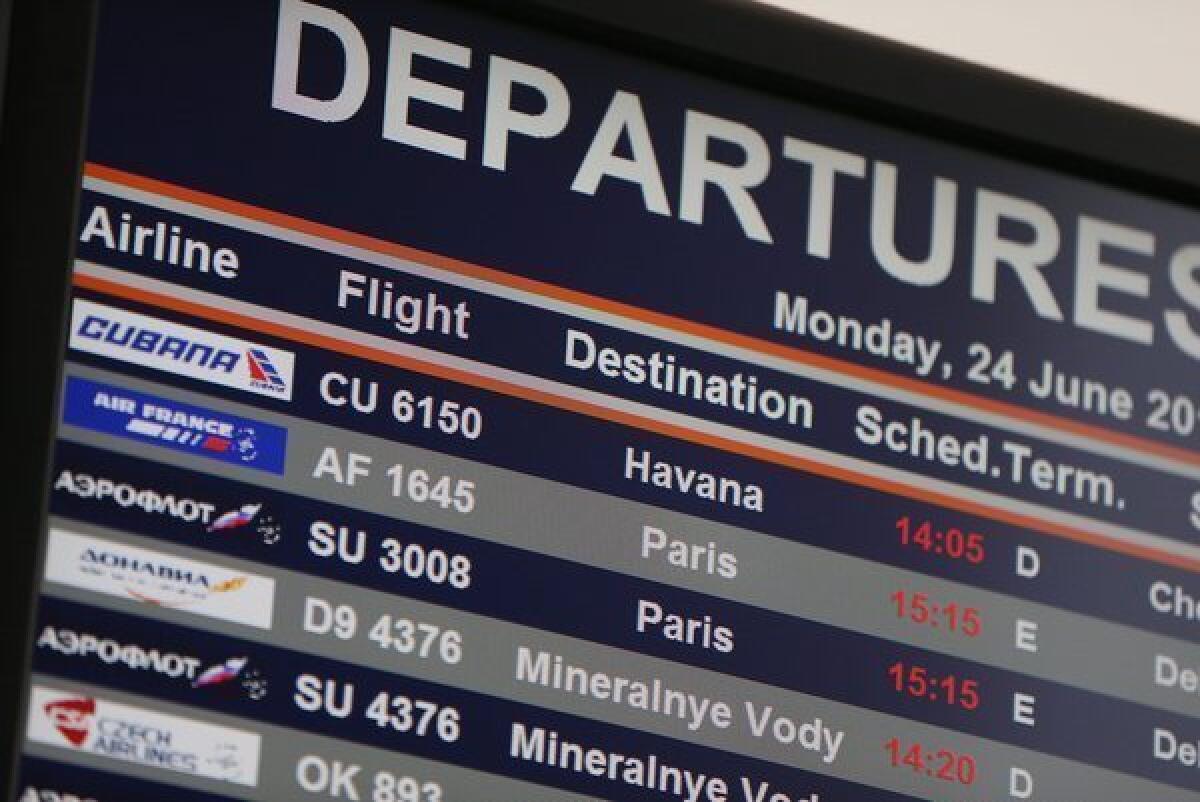How Edward Snowden managed to outfox everyone

- Share via
I hate to say this. Well, maybe I don’t.
It appears that Edward Snowden, the 30-year-old computer analyst hiding in broad daylight, has managed not only to throw a wrench into U.S. foreign policy but also to outfox the very national security apparatus whose overreach he warned against.
It’s pretty astonishing that our government can figure out a way to vacuum up our every phone call, email and text message but can’t get its hands on Snowden, who left Hong Kong for Russia on Sunday, and may be there still, as he figures out how to make his way to what he has (inexplicably) described as a democratic nation for asylum.
Republican South Carolina Sen. Lindsey Graham put his finger on it when he told Fox News on Sunday that “the freedom trail is not exactly China-Russia-Cuba-Venezuela.” (I guess somewhere along the line, Iceland dropped off Snowden’s list.)
In New Delhi during a three-day visit to India, Secretary of State John Kerry sarcastically called Russia and China “bastions of Internet freedom” and admonished governments that have helped or may help Snowden remain out of the grasp of American authorities.
“There would be, without any question, some effect and impact on the relationship, and consequences,” Kerry said, according to my colleague Henry Chu. “I’d urge them to live within the law. It’s in the interest of everyone.”
Still, one has to wonder why it took the government until Sunday to revoke Snowden’s passport, as the AP reported. It may not have mattered in the long run, but why wait two weeks to take that step?
When Snowden left Hong Kong, according to a detailed New York Times story posted Monday, he was allowed to pass through normal airport checkpoints, despite his annulled passport.
The story also said that Snowden decided to leave Hong Kong after attorneys there advised him that he might not be able to remain free on bail while fighting extradition to the U.S. If he were incarcerated during that time, they said, he would probably not have his computer. Giving up his computer, the attorney said, would be “totally intolerable.” (Forget waterboarding. Confiscate a 30-year-old’s computer and watch him beg for mercy.)
One also wonders why the feds revealed Friday that Snowden had been indicted on three felonies, including two charges under the 1917 Espionage Act, which made it likely, in the view of some foreign policy experts, that countries antagonistic to the United States (i.e., Cuba and Venezuela) would not be inclined to respect the State Department’s notice advising governments that Snowden should not be allowed transit to or through their countries.
In any case, as this amazing story continues, in slow motion, like a global version of the famous white Bronco chase, the Obama administration has itself to blame for this mess.
Forget the unforgivable lapses on the part of national security contractors, like Snowden’s former employer, Booz Allen Hamilton.
The sweeping nature of the spying program that Snowden revealed should never have been secret in the first place. While it’s reassuring when Keith Alexander, head of the National Security Agency, tells Congress that the program is responsible for “connecting dots” and stopping at least 50 terror plots since 9/11, it’s almost mind-boggling that the agency is just now instituting the security equivalent of the “buddy system,” designed to prevent analysts from unilaterally downloading material.
At a party in Los Angeles over the weekend, the murmured consensus among many guests with whom I chatted was “Let ‘em read my email, I have nothing to hide.” But that’s not really the issue. The American public has a right to know the broad outlines of the government’s electronic spying program, and exactly how it keeps us safe. Until Snowden provided proof of these programs’ existence to the Washington Post and the Guardian, the public — and indeed, most of Congress — had no idea of the extent of the surveillance.
Snowden’s “Where’s Waldo?” sideshow is riveting to watch, and may have unpleasant, if fleeting, implications for our relationships with the countries that have shown a willingness to help him out.
I’m not exactly sure I am cheering for his rapid repatriation, as I have mixed feelings about the charges he faces, which could get him up to 30 years in prison.
But the longer he’s out there, the more bumbling the U.S. government looks.
Twitter: @robinabcarian
Email: [email protected]
More to Read
Sign up for Essential California
The most important California stories and recommendations in your inbox every morning.
You may occasionally receive promotional content from the Los Angeles Times.











